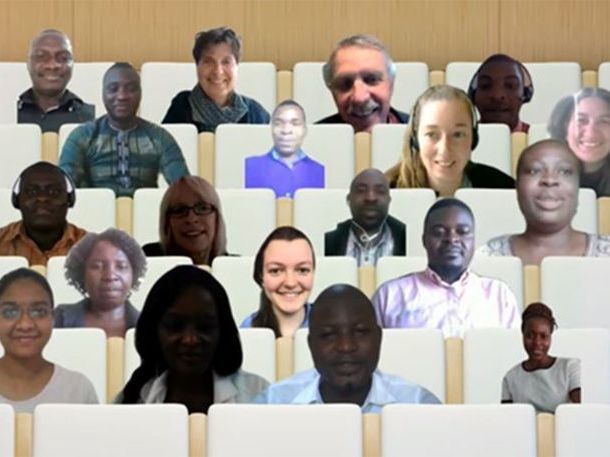International seminar on food processing and technologies in food production
From screen to practice
Advertisement
In a five-day international exposure seminar at the beginning of October, twenty experts from the food sector took part in further training on opportunities and challenges in food processing. More than ten speakers from German companies and authorities as well as professors from various faculties of the HSWT provided information via livestream about the regulatory and legal framework, technological possibilities and sales opportunities in industrial food processing in Germany. The participants from Benin, Ethiopia, Malawi, Mozambique, Nigeria, Zambia and India discussed and developed innovative ideas on the basis of the suggestions on how to optimize the production and storage processes in their companies. The Gesellschaft für internationale Zusammenarbeit (GIZ) and HSWT offered the seminar in cooperation.

Some of the participants and the lecturers of the exposure seminar, which was held digitally due to the corona virus pandemic.
HSWT
The seminar dealt with topics along the entire supply chain, from quality management and storage, traceability and certification to regulatory affairs in the production of animal and plant food products. The core of the learning format exposure seminar is the exchange of experience and knowledge among the participants and with the experts, with the aim of subsequently translating the newly gained knowledge into ideas for practical application.
In order to promote practical implementation, there will be a follow-up meeting in November at which the participants will report on the progress of the implementation of their ideas and receive support and once again the opportunity for professional exchange.
The seminar was financed by the Federal Ministry for Economic Cooperation and Development (BMZ) and GIZ as part of the 'Global Project Green Innovation Centres in the Agricultural and Food Sector' (GIAE), which is part of the BMZ initiative 'ONE WORLD - No Hunger'. The GICs are active in 16 African partner countries and promote innovations that increase farmers' income, create jobs and improve local food supplies.
Note: This article has been translated using a computer system without human intervention. LUMITOS offers these automatic translations to present a wider range of current news. Since this article has been translated with automatic translation, it is possible that it contains errors in vocabulary, syntax or grammar. The original article in German can be found here.
Most read news
Topics
Organizations
Other news from the department business & finance

Get the food & beverage industry in your inbox
By submitting this form you agree that LUMITOS AG will send you the newsletter(s) selected above by email. Your data will not be passed on to third parties. Your data will be stored and processed in accordance with our data protection regulations. LUMITOS may contact you by email for the purpose of advertising or market and opinion surveys. You can revoke your consent at any time without giving reasons to LUMITOS AG, Ernst-Augustin-Str. 2, 12489 Berlin, Germany or by e-mail at revoke@lumitos.com with effect for the future. In addition, each email contains a link to unsubscribe from the corresponding newsletter.






























































